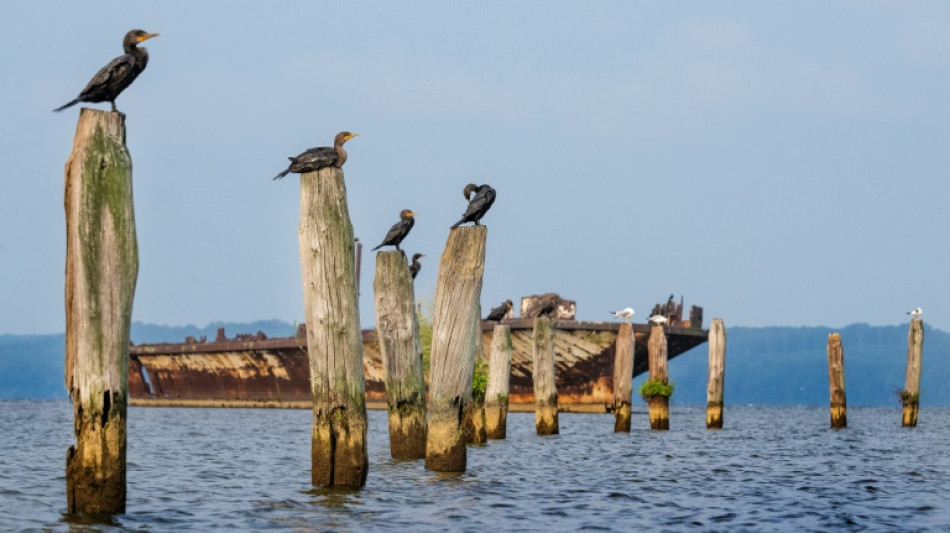
-
 Flights of fancy at Bottega Veneta, atmospheric mood at Armani in Milan
Flights of fancy at Bottega Veneta, atmospheric mood at Armani in Milan
-
Guardiola calls for respect after Ramadan break is booed

-
 Afghanistan warns Iran war will impact whole region
Afghanistan warns Iran war will impact whole region
-
Iran launches fresh strikes across Gulf after vowing revenge for slain leader

-
 OPEC+ hikes oil production by more than expected following outbreak of Iran war
OPEC+ hikes oil production by more than expected following outbreak of Iran war
-
Goggia tightens grip on World Cup super-G with victory in Andorra

-
 Belgium seizes Russian 'shadow fleet' tanker
Belgium seizes Russian 'shadow fleet' tanker
-
Raza steers Zimbabwe to 153-7 against South Africa

-
 Kerr on target as Australia make winning start to Women's Asian Cup
Kerr on target as Australia make winning start to Women's Asian Cup
-
Marquez says 'unlucky' to retire from MotoGP season opener

-
 9 killed in pro-Iran protest at US consulate in Pakistan's Karachi
9 killed in pro-Iran protest at US consulate in Pakistan's Karachi
-
Green clinches Singapore title with help from caddie husband

-
 More flights cancelled as Iran conflict shuts Mideast hubs
More flights cancelled as Iran conflict shuts Mideast hubs
-
'One Battle After Another' wins top producer award before Oscars

-
 Iran vows revenge for slain supreme leader despite Trump threat
Iran vows revenge for slain supreme leader despite Trump threat
-
Flights of fancy at Bottega Veneta with shimmering, tactile collection

-
 World Cup marks 100-day countdown amid political upheaval
World Cup marks 100-day countdown amid political upheaval
-
Bezzecchi wins MotoGP opener as Marquez retires

-
 Pro-Iran protesters try to storm US missions in Pakistan, Iraq
Pro-Iran protesters try to storm US missions in Pakistan, Iraq
-
8 killed in pro-Iran protest at US consulate in Pakistan's Karachi

-
 Latest developments after US, Israeli strikes kill Iran's Khamenei
Latest developments after US, Israeli strikes kill Iran's Khamenei
-
Before dawn, ancient drum rite wakes Istanbul faithful to fast

-
 Music, mourning as Iran's Khamenei is killed
Music, mourning as Iran's Khamenei is killed
-
Pakistan cricket's lack of T20 evolution exposed by World Cup exit

-
 Cobolli downs Tiafoe to claim Mexican Open
Cobolli downs Tiafoe to claim Mexican Open
-
Takele defends Tokyo Marathon title after sprint finish

-
 Hollywood's finest gather for guild's Actor Awards
Hollywood's finest gather for guild's Actor Awards
-
Iran prepare for Women's Asian Cup as bombs drop on homeland

-
 Doncic shines as Lakers cruise past depleted Warriors
Doncic shines as Lakers cruise past depleted Warriors
-
3D tool Unreal Engine makes real impact in creative industries

-
 OPEC+ mulls oil production increase in shadow of war
OPEC+ mulls oil production increase in shadow of war
-
Putin, Russia's eternal leader defined by war and power

-
 Explosion, gunfire as Afghan forces shoot at aircraft over Kabul
Explosion, gunfire as Afghan forces shoot at aircraft over Kabul
-
Iranians across North America rally for -- and against -- strikes

-
 Shakespeare would have shunned streaming, 'Hamnet' team says
Shakespeare would have shunned streaming, 'Hamnet' team says
-
Will Oscars be 17th time lucky for songwriter Diane Warren?

-
 Sympathy for the bedeviled: the likable conspiracy theorist of 'Bugonia'
Sympathy for the bedeviled: the likable conspiracy theorist of 'Bugonia'
-
Texas port humming as Trump ramps up Venezuela oil

-
 76ers' center Embiid to miss at least three games with oblique strain
76ers' center Embiid to miss at least three games with oblique strain
-
US, Israel defend strikes at UN as Iran alleges 'war crime'

-
 Brumbies' 'mental resolve' keeps them unbeaten in Super Rugby
Brumbies' 'mental resolve' keeps them unbeaten in Super Rugby
-
Iran attacks rock Dubai's Palm, Burj Al Arab, airport

-
 JP Anderson Signs Landmark MOU with Vaama Village to Advance Rare Earth Mineral Development in Bonthe District
JP Anderson Signs Landmark MOU with Vaama Village to Advance Rare Earth Mineral Development in Bonthe District
-
Iran leader Khamenei killed in massive US and Israeli attack, Trump says

-
 UK pop-soul star Olivia Dean sweeps Brit Awards
UK pop-soul star Olivia Dean sweeps Brit Awards
-
Iranians across North America take to the streets for - and against - strikes

-
 'Turning point' as Crusaders notch first Super Rugby win
'Turning point' as Crusaders notch first Super Rugby win
-
White House releases photos of Trump, Vance during Iran ops

-
 PSG win to extend lead over Lens at top of Ligue 1
PSG win to extend lead over Lens at top of Ligue 1
-
Barca's Yamal nets hat-trick in Villarreal romp, Atletico go third


New research reveals where N. American bird populations are crashing
Birds are facing a population crisis, but a lack of high-quality localized data has made it difficult to understand the drivers behind specific declines and to craft effective conservation responses.
Now, a team of researchers has developed an innovative solution, combining vast amounts of data from a popular birding app with machine learning and advanced statistical methods to overcome the challenges posed by large-scale citizen science projects.
Their study, published Thursday in Science, reveals that North American bird populations are being hit hardest in their traditional strongholds, as rapid environmental shifts -- including climate change -- disrupt these once-reliable refuges.
"We have known for a long time that bird populations are declining," lead author Alison Johnston, an ornithologist and ecological statistician at the University of St Andrews, told AFP.
"What we aimed to do here was to look at better population trends in much more detail," she said -- data that is "a lot more tailored for conservation decisions and understanding what we can actually do on the ground."
A landmark 2019 paper also in Science found that North America had lost 2.9 billion breeding adult birds between 1970 and 2017 -- a net loss of nearly a third. The 2025 US State of the Birds report found continued declines in nearly every ecological biome.
Birds play vital roles in ecosystems, from pollinating plants and dispersing seeds to controlling pests.
Their loss disrupts food chains, undermines forest health, reduces crop yields -- and deprives people of the joy of watching species that have long been part of human culture.
But the threats are diverse: from prairie loss impacting Baird's Sparrows in the Midwest to Hawaiian birds threatened by rising seas and invasive predators, including cats.
Johnston and colleagues turned to eBird, an open-source project, analyzing 36 million observations spanning 2007 to 2021 across North America, Central America, and the Caribbean.
A major challenge with citizen science data is separating changes in bird populations from changes in how people watch birds.
The team overcame this with several innovations: using only checklists where observers recorded all species seen; accounting for variables like observation time and distance traveled; and applying a machine learning model that controlled for shifting birding behavior.
They validated the approach through thousands of simulations, ultimately focusing on 495 species for which the results proved reliable.
Unlike previous monitoring that tracked trends at the state or regional level, their analysis looked at plots 27 kilometers by 27 kilometers (17 miles by 17 miles) -- roughly the size of New York City.
Key findings included that 97 percent of species had both areas of increasing population and areas of decline, revealing hidden complexity.
Wood ducks for instance are declining in the Southeast US but thriving farther north, suggesting a climate-related shift.
The study also found that 83 percent of species are shrinking fastest in areas where they were most abundant, particularly grassland and aridland breeders.
The reasons aren't fully known, but one theory is that birds adapted to rich environments may be less resilient to rapid change than those evolved for harsher conditions.
Conversely, some aridland, forest, and generalist species are rebounding in parts of their range where they were once scarce -- pointing to pockets of opportunity.
The findings are already being used by wildlife agencies, for example in permitting wind energy projects to minimize impacts on species such as Bald Eagles.
A.Rodriguezv--AMWN


